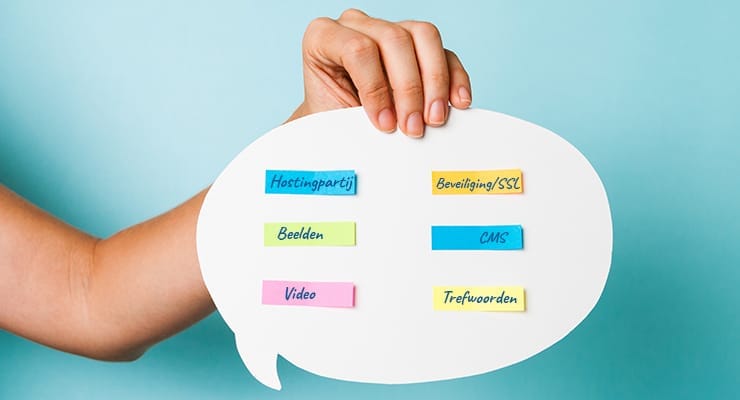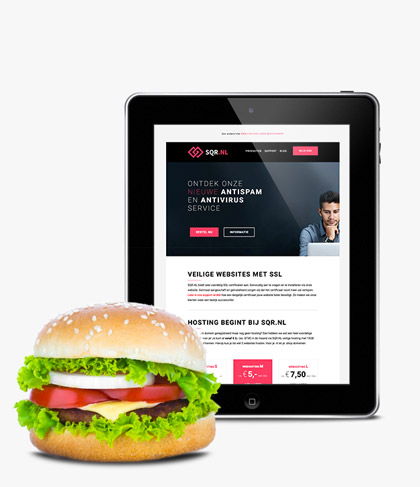SEO tips for your website

A well-built website or web shop is a must to rank nicely in search engines. For this, a good CMS like
WordPress
,
Joomla!
, Magento 2 or ‘Drupal ‘ is essential. You can read more about this in our article on
the right choice of CMS
.
Other things that help with good search engine rankings are:
In this article with SEO tips, we will elaborate on putting focus, making a good URL and tips for writing texts which are very important components for a good findability of your website or webshop.
Clear focus
Make sure your page has a clear focus. Talk about one product or service and then create new pages for related services or products. Of course, you can display these as separate articles or advertisements on your (landing) page. Similarly, you can write your text around that one service or product. Go for a focus keyword. If your page is about a child’s bike, make sure “child’s bike” is your focus keyword. We will return to this further in this article. There is no one-size-fits-all answer to the percentage of keyword density. As explained in detail in the article from
Optimus Online
.
Create a clear URL
You can use your URL to describe the web page you’re referring to, allowing your visitors (and Google) to immediately see what the page is about. For example, with the new extensions like
.shop
and
.media
indicate directly what the site is about. Check
here
if your domain name is still available and what options are available. If you want to rank well in Google, you better pay some extra attention to your URLs. In fact, a good URL is indispensable if you want to improve your SEO and is even one of the most important parts! So spend time on this!
What is a URL?
The link to a Web site or page is called a “URL (Uniform Resource Locator). The URL is in the browser bar of your web browser, and all your URLs begin with the URL of your homepage. In our case, that URL is
https://hosting.nl
The URL of our web hosting page then becomes
https://hosting.nl/products/webhosting/
.
What makes a URL good?
So how do you write a good URL? As we mentioned, a good URL is necessary to rank higher in Google and to make it clear to your visitors what a particular page is about. And these tips can help you do just that:
- Use keywords/keywords: Preferably put the keyword at the front of your URL. This way, search engines immediately know what your page is about and can show you better search results.
- Describe what your page is about: This way, your readers will immediately have a good idea of what your article is about. It makes your URL more user-friendly, which in turn can cause people to share your link faster. And a URL that is easy for people to read is also easy for search engines to read.
- Keep it short: Use only search and key words and omit the remaining words (the, the, a, of, etc.).
- Avoid uppercase letters: Some servers see URLs with uppercase and lowercase letters as two separate links. If people type in your URL but type a capital letter as lowercase, they will get an error message and will not be able to reach your page.
- Ensure consistency: Always use the same format for your URLs. So not the one time
https://hosting.nl/products/webhosting/
and the next time “https://hosting.nl/email/products/. When you are consistent, search engines see how your pages are organized, and that improves your SEO.
Customize URL
In WordPress, you can change the URL very simply. Once you create a new post, below the title is the permalink section. The link after that becomes the URL of the article (or page) you are creating. You can click edit to adjust the last part of your URL (also called slug) to make it more SEO-friendly. In the case of the children’s bike: make sure this word appears in the URL. If you have already given the page title this focus keyword, it is included as in the URL. Do check the automatically generated URL if it meets your needs and adjust it manually if necessary.
Content writing
Now that you have a clear focus on what the page is about, you can write or check your texts. The focus keyword should appear several times in your text. In addition to the URL and the page title -with a <h1> style- it is advisable to use the focus keyword in the intro as well, and in the body text several more times. Also, divide your text into paragraphs with headings that make clear what the paragraph is about. If these subheadings are formatted from your style sheet (for example, Heading 2, 3 or 4 depending on the structure of heading, subheading and subheadings) then that in turn provides information to search engines about the relevance of that paragraph. Also insert links in your text to other relatable pages or articles on your own site or from other parties. In the latter case, though, make sure you have the page open in a new window so you don’t lose traffic as soon as they close the page.
Length of text
On average, search engines mark pages with about 300 words as “relevant. With less text, the probability of a lower score is a lot higher. SEO plugins like Yoast indicate this clearly by means of a traffic light that quickly shows where improvements can still be made. More on this in our article on “Optimizing Web Texts with Yoast. Also provide bulleted lists in your text with relevant words and possibly links or anchors to pages or paragraphs.
Image
As we mentioned in
Images and search engine optimization
already wrote, it is advisable to include images on your page. Also because we are now very visually oriented. Also consider your logo and icons of the social media channels you can be found on. We will elaborate on linking social media channels and using Google later.
Hopefully we have given you clear information again to help you put up a successful website. Please feel free to contact us with questions such as
WordPress hosting
at hallo@sqr.nl.
